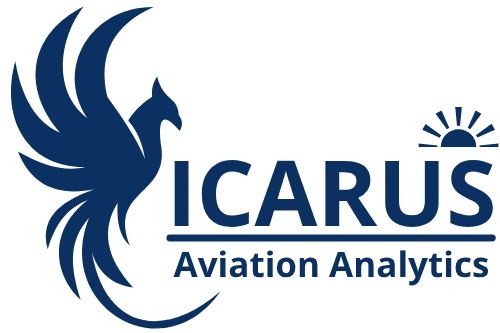Why Submitting Statistics to Aviation Authorities Is Vital for Airlines
Fi
Estimated reading time: 5 minutes
For years, many airlines have viewed the submission of operational statistics to authorities as a burdensome, repetitive task with little apparent return. Those of us who have walked this path know how tortuous it can feel, but in reality, the opposite is true.
Statistics are one of the few regulatory requirements that, when done well, protect the airline, enhance its international visibility, and strengthen its position in the market.

1. States make key decisions based on what airlines report
Civil aviation authorities do not request statistics to be inconvenient. They need them to:
- Measure actual and projected supply on each route.
- Evaluate the need, relevance, and negotiation tools for new bilateral agreements.
- Determine capacities, frequencies, fifth freedom rights or additional traffic rights.
- Monitor safety-related trends linked to operational activity.
- Produce national indicators that inform economic and connectivity decisions.
- Calculate the contribution of the subsector to the Gross Domestic Product (GDP).
- Analyse the interaction between the subsector and other economic sectors such as tourism and international trade. Yes, international trade: air cargo is one of the subsectors that provides the most information for understanding the performance of the real global economy.
- Assess the economic impact of new regulations or tariff changes (taxes, airport charges, etc.).
- Provide inputs for aviation infrastructure planning.
- Support decisions related to international instruments such as the Cape Town Convention (Article 7, on the registration and priority of international interests in aircraft), which depend on reliable statistics to evaluate actual fleet utilisation, operational demand and the economic soundness required to authorise or support aircraft asset transactions.
- And most importantly: generate transparency and accountability to the travelling public, demonstrating the relevance of air transport to the economy, employment, and everyday life.
If an airline reports late or incompletely, its profile becomes under-represented in all these processes.
Airlines that report on time become visible, reference points, and the ones States consider during negotiations.
That is power!
2. Accurate statistics protect airlines in competitive scenarios
Imagine two airlines operating the same route:
one reports all its flights on time, the other reports late or with inconsistencies.
When the authority assesses saturation, efficiency or slot allocation:
The compliant airline has solid data to support its actual operations.
The one that reports poorly appears to operate less than it really does; authorities may even need to estimate or adjust figures, inadvertently introducing bias.
Outcome:
the airline with poor reporting may lose commercial opportunities, frequencies or growth potential without even realising it.
Even worse: if the information is incomplete or biased, incorrect calculations can produce results that negatively affect both airlines, not just the one that reports poorly.

3. Statistics feed international systems: ICAO, IATA, the United Nations, financial institutions
The data submitted by an airline to its State does not stay in a drawer. It flows into global systems that:
- Are used to produce the statistical tables of the ICAO Annual Report of the Council, the industry’s most authoritative figures. And perhaps most importantly: the financial assessments that each ICAO Member State pays are based on reported traffic.
- Are used to report on the United Nations Sustainable Development Goals, specifically the SDG Global Indicator 9.1.2: Passenger and freight volumes, by mode of transport.
- Are used by IATA for interline proration, market analysis, and financial adjustments that directly impact airline revenues.
- Remain essential for analysing the economic impacts on the subsector caused by events such as the COVID-19 pandemic or natural, political or social disruptions.
- Support legal frameworks such as the Cape Town Convention, where risk assessment, asset utilisation and economic stability require reliable statistical evidence.
An airline that reports poorly can appear smaller, less efficient or less relevant than it truly is, in contexts where comparisons matter.
4. ATRs are not just “templates”… they are the official narrative of your airline
The figure that appears in an ATR is your officially recognised reality.
Even if your internal system says otherwise, what reaches the authority becomes the institutional truth.
- If you inflate ASK, your PLF falls artificially.
- If you report fewer passengers, your market share drops.
- If you omit cargo information, your economic role disappears from sectoral analyses.
This statistical profile shapes how regulators, competitors, analysts and investors perceive your airline.
5. Good statistics prevent future problems
Reporting accurately and on time helps avoid:
- Repeated emails from the authority requesting clarifications.
- Internal rework.
- Risks of regulatory non-compliance.
An airline with a track record of clean reporting is an airline that inspires confidence.
6. Reporting statistics is not a cost: it is an investment in positioning and governance
Airlines that understand this know that:
- Sound statistics drive more accurate internal decision-making.
- They allow for realistic route profitability analysis.
- They facilitate certification, auditing and international negotiation processes.
- They demonstrate technical maturity to the authority.
Most importantly:
an airline with reliable data is an airline with real competitive advantages.
7. How Icarus Aviation Analytics turns “compliance” into “strategy”
At Icarus, we transform statistical compliance into a strategic asset by:
- Fully automating ATR production.
- Using intelligent validations that ensure correct data from the source.
- Implementing systems that eliminate manual tasks and reduce errors.
- Providing executive reports for management and operations.
- Delivering technical support to strengthen the relationship with the authority.
When data is reliable, everything improves:
from regulatory reputation to the real capacity to grow on international routes.

Conclusion
In conclusion, when an airline reports its statistics accurately and on time, it does far more than comply: it gains visibility, protects its operations, and strengthens its influence in regulatory, commercial, and financial decisions. Statistics are not a formality; they are a strategic advantage that separates airlines that grow from those that merely submit forms.
➡️ Download the ICARUS Insights Series Nº 1 (PDF)
